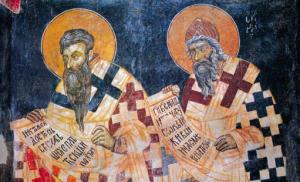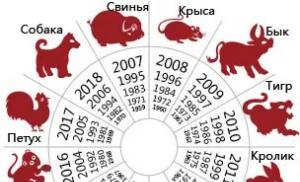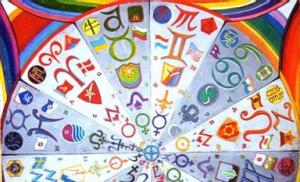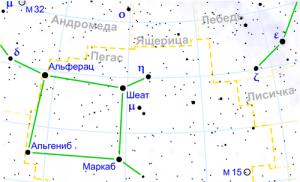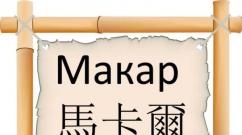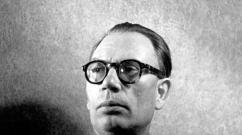How many times did Brezhnev become a hero of the Soviet Union? Military awards of Leonid Ilyich Brezhnev: review, history and interesting facts
| Monument in Novorossiysk | ||
| Bronze bust in Dneprodzerzhinsk | ||
| In Moscow at the grave near the Kremlin wall | ||
| Bust in Moscow | ||
| Bust in Vladimir | ||
| At the Kremlin wall (view 2) | ||
| Memorial plaque in Dneprodzerzhinsk | ||
| Memorial plaque in Dnepropetrovsk | ||
| Memorial plaque in Moscow (old) | ||
| Memorial plaque in Dneprodzerzhinsk (2) | ||
| Memorial plaque in Dneprodzerzhinsk (3) | ||
| Memorial plaque in Dneprodzerzhinsk(4) | ||
| Memorial plaque in Moscow (new) | ||
| Memorial plaque in Kursk |
Leonid Ilyich Brezhnev - General Secretary of the Central Committee of the Communist Party of the Soviet Union, Chairman of the Presidium of the Supreme Soviet of the USSR, Marshal of the Soviet Union.
Born on December 6 (19), 1906 in the village of Kamenskoye, Yekaterinoslav district, Yekaterinoslav province, now the city of Kamenskoye (in 1936-2016 - Dneprodzerzhinsk), Dnepropetrovsk region of Ukraine, in the family of a metallurgist. Russian. He began his working life at the age of 15. After graduating from the Kursk Land Management and Reclamation Technical School in 1927, he worked as a land surveyor in the Kokhanovsky district of the Orsha district of Belarus, in the Kursk province and in the Urals - as the head of the district department and deputy chairman of the executive committee of the Bisertsky District Council, first deputy head of the Ural Regional Land Administration. In 1923 he joined the Komsomol. Member of the CPSU(b)/CPSU since 1931. After graduating from the Dneprodzerzhinsk Metallurgical Institute in 1935, he became an engineer at the Dneprodzerzhinsk Metallurgical Plant.
In October 1935 - October 1936 L.I. Brezhnev served in active military service: cadet of the Trans-Baikal Armored School, political instructor of a tank company of the 14th Mechanized Corps in the Trans-Baikal Military District.
From October 1936 to May 1937 he worked as director of the Dneprodzerzhinsk Metallurgical College. In May 1937 L.I. Brezhnev was elected deputy chairman of the executive committee of the Dneprodzerzhinsk City Council for construction and urban management. From May 1938 - head of the department of Soviet trade, and from February 1939 - secretary for propaganda of the Dnepropetrovsk regional committee of the Communist Party (b) of Ukraine.
Since the beginning of the Great Patriotic War, L.I. Brezhnev is in the active army, assigned to political work. Deputy head of the political department of the Southern Front (06/28/1941-09/16/1942), deputy head of the political department of the Black Sea Group of Forces (10/8/1942-04/1/1943), head of the political department of the 18th Army (04/1/1943-05/9/1944), deputy head of the political department 4th Ukrainian Front (05/9/1944-05/12/1945), head of the political department of the 4th Ukrainian Front (05/12/1945-07/9/1945). He carried out extensive organizational and political work directly in formations, units and subunits to mobilize personnel to solve combat missions.
At the Victory Parade on Red Square in Moscow on June 24, 1945, Major General Brezhnev L.I. took part as a commissar of the consolidated regiment of the 4th Ukrainian Front (commander of the consolidated regiment - Guard Lieutenant General, Hero of the Soviet Union A.L. Bondarev). Initially, he continued to serve in the Red Army: head of the political department of the Carpathian Military District (07/9/1945-07/18/1946). On July 18, 1946 he was transferred to the reserve.
Since August 30, 1946, L.I. Brezhnev - 1st Secretary of Zaporozhye, from November 22, 1947 - 1st Secretary of the Dnepropetrovsk Regional Committee of the Communist Party of Ukraine. From June 26, 1950 - 1st Secretary of the Central Committee of the Communist Party of Moldova. From October 25, 1952 to March 5, 1953 - Secretary of the CPSU Central Committee.
Since August 1953 - again in military service. From March 5 to May 21, 1953 Brezhnev L.I. - Head of the Political Directorate of the USSR Naval Ministry. From May 21, 1953 to February 27, 1954 - Deputy Head of the Main Political Directorate of the Soviet Army and Navy. Since February 1954 - in reserve.
From February 6, 1954 - 2nd, and from August 6, 1955 - 1st Secretary of the Central Committee of the Communist Party of Kazakhstan. Since March 6, 1956, Secretary of the CPSU Central Committee and candidate member of the Presidium of the CPSU Central Committee. Since June 29, 1957 - member of the Presidium of the CPSU Central Committee. During this period, on behalf of the Central Committee, he dealt with the development of heavy industry and construction, the development and production of the latest military equipment and weapons, equipping the Soviet Armed Forces with them, and the development of astronautics.
Decree of the Presidium of the Supreme Soviet of the USSR dated June 17, 1961 “for outstanding achievements in the creation of rocket technology samples and ensuring the successful flight of the Soviet man into outer space” Brezhnev Leonid Ilyich awarded the title of Hero of Socialist Labor with the Order of Lenin and the Hammer and Sickle gold medal.
From May 7, 1960 to July 15, 1964 L.I. Brezhnev - Chairman of the Presidium of the Supreme Soviet of the USSR. At the same time, from June 22, 1963 - Secretary of the CPSU Central Committee.
At the plenum of the CPSU Central Committee on October 14, 1964, L.I. Brezhnev was elected First Secretary of the CPSU Central Committee and confirmed as Chairman of the Bureau of the CPSU Central Committee for the RSFSR.
Since April 8, 1966 L.I. Brezhnev - General Secretary of the CPSU Central Committee and member of the Politburo of the CPSU Central Committee, at the same time since June 16, 1977 - Chairman of the Presidium of the Supreme Soviet of the USSR.
Decree of the Presidium of the Supreme Soviet of the USSR dated December 18, 1966 “for outstanding services to the Communist Party and the Soviet state in communist construction, in strengthening the country’s defense capability and great merits in the fight against the Nazi invaders at the front during the Great Patriotic War in connection with the 60- birthday anniversary" Brezhnev Leonid Ilyich awarded the title of Hero of the Soviet Union with the Order of Lenin and the Gold Star medal.
By Decree of the Presidium of the Supreme Soviet of the USSR dated December 18, 1976 “for outstanding services to the Communist Party and the Soviet state in communist construction, active, fruitful work to strengthen peace and security of peoples, for great personal contribution to the victory over the Nazi invaders in the Great Patriotic War war, in strengthening the economic and defense power of the Soviet Union and in connection with the 70th anniversary of his birth, the Marshal of the Soviet Union was awarded the Order of Lenin and the second Gold Star medal.
Decree of the Presidium of the Supreme Soviet of the USSR dated December 19, 1978 “for outstanding services to the Communist Party and the Soviet state in strengthening the economic and defense power of the Soviet Union during the Great Patriotic War and in the post-war period, for tireless work in the struggle for peace and in connection with the day birth" was awarded the Order of Lenin and the third medal "Gold Star".
Decree of the Presidium of the Supreme Soviet of the USSR dated December 18, 1981 “for outstanding services to the Communist Party and the Soviet state in strengthening the economic and defense power of the Soviet Union, great personal contribution to achieving victory over the Nazi invaders during the Great Patriotic War, restoration and further development of the national economy of the USSR in the post-war period, tireless activity in the struggle for peace, for the fruitful leadership of communist construction and in connection with the 75th anniversary of his birth" was awarded the Order of Lenin and the fourth Gold Star medal.
L.I. Brezhnev L.I. was elected as a deputy of the Supreme Soviet of the USSR of the 3rd-10th convocations (1950-1982).
L.I. Brezhnev died on November 10, 1982. He was buried in Moscow on Red Square near the Kremlin wall. There is a granite bust on the grave.
Military ranks:
brigade commissar (June 1941),
Colonel (12/15/1942),
Major General (11/2/1944),
Lieutenant General (08/04/1953),
Army General (03/22/1974),
Marshal of the Soviet Union (05/07/1976).He was awarded eight Orders of Lenin, two Orders of the October Revolution, two Orders of the Red Banner, the Order of Bohdan Khmelnitsky 2nd degree, the Order of the Patriotic War 1st degree, the Red Star, medals, and numerous foreign orders. Honorary citizen of the city of Dnepropetrovsk (1979).
On February 20, 1978, he was awarded the highest Soviet military order "Victory", but the Presidium of the Supreme Soviet of the USSR, by its Decree of September 21, 1989, canceled the 1978 Decree on awarding Brezhnev L.I. the Order of Victory, as contrary to the statute of this order.
Awarded the International Lenin Prize "For Strengthening Peace Between Nations" (1973), the Lenin Prize for Literature (1979).
Bronze bust of L.I. Brezhneva L.I. installed in the city of Dneprodzerzhinsk. On September 16, 2004, a monument to L.I. was unveiled in the hero city of Novorossiysk. Brezhnev. Monuments were also erected in Moscow and Vladimir. Name L.I. Brezhnev from 1982 to 1988 wore the city of Naberezhnye Chelny (Tatar Autonomous Soviet Socialist Republic), areas in Moscow and Dneprodzerzhinsk. His name was given to the Oskol Electrometallurgical Plant, the Yuzhny Machine-Building Plant production association, the Novorossiysk Cement Plant, and the Volgodonsk Atommash Production Association. All titles were canceled in 1988. In Moscow, memorial plaques are installed on the house in which he lived, and in Kursk on the building in which he studied.
Essays:
Lenin's course: Speeches and articles. T. 1-9. M., 1973-1983;
Memories. M., 1983.
Full list of awards of L.I. Brezhnev.
State awards of the USSR:
4 medals “Gold Star” of the Hero of the Soviet Union (12/18/1966 - No. 11320, 12/18/1976 - No. 97/II, 12/19/1978 - No. 5/III, 12/18/1981 - No. 2/IV)
Medal "Hammer and Sickle" of the Hero of Socialist Labor (06/17/1961)
8 Orders of Lenin (12/2/1947 - No. 66231, 12/18/1956 - No. 281153, 06/17/1961 - No. 344996, 12/18/1966 - No. 382246, 10/2/1971 - No. 401096, 12/18/1976 - No. 4 25869, 12/19/1978 - No. 432408, 12/18/1981 - No. 458500)
Order of "Victory" (02/20/1978 - No. 20), award canceled by Decree of the Presidium of the Supreme Soviet of the USSR 09/21/1989
2 Orders of the October Revolution (03/14/1979 - No. 58256, 12/18/1980 - No. 87064)
2 Orders of the Red Banner (03/27/1942 - No. 23636, 05/29/1944 - No. 8148/2)
Order of Bohdan Khmelnitsky, 2nd degree (05/23/1945 - No. 1182)
Order of the Patriotic War, 1st degree (09/18/1943 - No. 11025)
Order of the Red Star (03/16/1943 - No. 102567)
Medal "For Military Merit"
Medal "For the Defense of Odessa"
Medal "For the Defense of the Caucasus"
Medal "For the Liberation of Warsaw"
Medal "For the Capture of Vienna"
Medal "For Valiant Labor in the Great Patriotic War of 1941-1945"
Medal "For Victory over Germany in the Great Patriotic War of 1941-1945"
medal "For the restoration of ferrous metallurgy enterprises of the south" medal "For the development of virgin lands"
medal "In memory of the 250th anniversary of Leningrad"
medal "In memory of the 1500th anniversary of Kyiv"
medal "40 years of the USSR Armed Forces"
medal "50 years of the USSR Armed Forces"
medal "60 years of the USSR Armed Forces"
medal "Twenty years of victory in the Great Patriotic War 1941-1945"
medal "Thirty years of victory in the Great Patriotic War 1941-1945"
Medal “For Valiant Labor. In commemoration of the 100th anniversary of the birth of V.I. Lenin"
Lenin Prize Laureate Medal (04/20/1979)
Honorary weapon - a personalized saber with a gold image of the State Emblem of the USSR (12/18/1976)Foreign awards:
Argentina Award:
Order of the May Revolution, 1st class (1974)
Award of the Democratic Republic of Afghanistan:
Order of the Sun of Freedom (12/16/1981)
Awards of the People's Republic of Bulgaria:
3 Gold Stars of the Hero of the People's Republic of Bulgaria (8.09.1973, 12.1976, 12.1981)
3 orders of Georgiy Dimitrov (8.09.1973, 12.1976, 12.1981)
medal "100 years of liberation of Bulgaria from the Ottoman yoke" (1978)
medal "30 years of the Socialist Revolution in Bulgaria" (1974)
medal “90 years since the birth of G. Dimitrov” (1974)
medal "100 years since the birth of G. Dimitrov" (1982)
Awards of the Hungarian People's Republic:
2 Orders of the Banner of the Hungarian People's Republic with diamonds (12/17/1976, 12/18/1981)
Awards of the Socialist Republic of Vietnam:
Gold Medal of the Hero of Labor of the Socialist Republic of Vietnam (12/21/1981)
Order of Ho Chi Minh, 1st class (12/21/1981)
Order of the Golden Star (07.1980)
Award of the Republic of Guinea:
Order of Independence (02.1961)
Awards of the German Democratic Republic:
3 Gold Stars of the Hero of the German Democratic Republic (12/13/1976, 12/18/1979, 12/18/1981)
3 Orders of Karl Marx (10.1974, 12.18.1979, 12.18.1981)
Big Star of the Order of Friendship of Peoples with diamonds (12/13/1976)
Medal "For Merit in Strengthening the GDR" (1979)
Indonesia Awards:
2 stars and insignia of the Order of the Star of Indonesia, 1st class (1961, 1976)
Award of the Democratic People's Republic of Yemen:
Order of the Revolution October 14 (09.1982)
Award of the Democratic People's Republic of Korea:
Order of the State Banner, 1st degree (08/19/1982)
Awards of the Republic of Cuba:
Gold Star of the Hero of Cuba (12/15/1981)
Order of José Martí (01/29/1974)
Order of Carlos Manuel de Cespedes (12/15/1981)
Order of Playa Giron (12/15/1976)
medal "20 years of the assault on the Moncada barracks" (1973)
medal "20 years of the Revolutionary Armed Forces" (1976)
Awards of the Lao People's Democratic Republic:
Gold Star of the Hero of the Lao People's Democratic Republic (12/15/1981)
Gold Medal of the Nation (12/15/1981)
Awards of the Mongolian People's Republic:
2 Gold Stars of the Hero of the Mongolian People's Republic (12/14/1976, 12/1981)
4 Orders of Sukhbaatar (1966, 1971, 12/14/1976, 12/1981)
medal "30 years of Victory at Khalkhin Gol" (1969)
medal "40 years of Victory at Khalkhin Gol" (1979)
medal "50 years of the Mongolian People's Revolution" (1971)
medal "50 years of the Mongolian People's Army" (1971)
medal "30 years of Victory over Japan" (1975)
Award of the Republic of Peru:
Order of the Sun of Peru, 1st class (06.1978)
Awards of the Polish People's Republic:
Grand Cross of the Order “Virtuti Militari” (07/21/1974, award canceled 07/10/1990)
Grand Cross of the Order of the Renaissance of Poland, 1st class (1976)
star and badge of the Order of Merit of the People's Republic of Poland, 1st class (12.1981)
Order of the Cross of Grunwald, 2nd class (1946)
medal "For the Oder, Neisse, Baltic" (1946)
medal "Victory and Freedom" (1946)
Awards of the Socialist Republic of Romania:
Order "Star of Romania" 1st class (11/24/1976)
Order "Victory of Socialism" (12.1981)
Finnish Award:
star and badge of the Order of the White Rose, 1st class (12/16/1976)
Awards of the Czechoslovak Socialist Republic:
3 Gold Stars of the Hero of the Czechoslovak Socialist Republic (5/5/1970, 10/29/1976, 12/16/1981)
4 orders of Klement Gottwald (05/5/1970, 10/29/1976, 05/1978, 12/16/1981)
Order of the White Lion "For Victory" 1st degree (1946)
star and badge of the Order of the White Lion with chain (02.1973)
2 Military Crosses 1939 (1945, 1947)
medal "For bravery in front of the enemy" (1945)
War Commemorative Medal (1946)
Dukela Commemorative Medal (1960)
medal "20 years of the Slovak National Uprising" (1964)
medal "50 years of the Communist Party of Czechoslovakia" (1971)
medal "30 years of the Slovak National Uprising" (1975)
Medal "For Strengthening Friendship in Arms" 1st class (1980)
Socialist Ethiopia Award:
Order of the Star of Honor (10.1980)
Awards of the Socialist Federal Republic of Yugoslavia:
Order of the Star of Yugoslavia, 1st class (1962)
Order of Liberty with Diamonds (1976)Awards from international and public organizations
medal of the laureate of the International Lenin Prize “For strengthening peace between nations” (06/12/1973)
Gold Peace Medal named after F. Joliot-Curie (11/14/1975, from the World Peace Council)
Medal of the State Prize named after K. Gottwald (03.1975)
UN Gold Peace Medal named after O. Gan (09.1977)
Gold medal named after Karl Marx (11/16/1977, from the USSR Academy of Sciences)
medal of the laureate of the G. Dimitrov Prize (11/23/1978)
Gold medal of the International Peace Prize “Golden Mercury” (10/13/1980)
badge “50 years in the CPSU” (from the CPSU Central Committee) (1981)
Gold medal of the World Federation of Trade Unions (02/15/1982)
On November 10, 1982, the General Secretary of the CPSU Central Committee, Chairman of the Presidium of the Supreme Council, Leonid Ilyich Brezhnev, passed away.
Brezhnev became famous for his suppression of dissent, the fight against so-called parasitism, the accumulation of an unprecedented military arsenal of the country (which led to a depressing shortage of consumer goods), a permanent leadership apparatus (which caused large-scale corruption and depressing political stagnation), and also an addiction to awards and passionate kisses with comrades.
Before stagnation and shortages, there was a short period of developed socialism - in the absence of abundance, citizens received goods and affordable entertainment and recreation at low prices, and medical services, education, public housing for use were completely free. How such extravagance was ensured is a separate pressing question, but the mass of ordinary citizens were extremely pleased.
Leonid Ilyich was born on December 19, 1906, graduated from labor school, Kursk Land Management and Reclamation College, and Dneprodzerzhinsk Metallurgical Institute. His career progressed stubbornly: from an ordinary land surveyor to election to the central committee of the CPSU (1956), membership in the Presidium of the CPSU Central Committee, chairmanship of the Presidium of the Supreme Council, active participation in the conspiracy to remove General Secretary Nikita Khrushchev and taking his post in 1964. However, the ongoing farce of planting the cult of the new leader of socialism rather shows the puppet nature of such a ruler; many historians talk about the virtual omnipotence of the party apparatus, the KGB and the army elite.
Under Brezhnev, who served as Secretary General for 18 years, the political life of the country was mothballed, confirmed by the unshakable stability of the unusually conservative composition of the leadership of the USSR. Then they abandoned the rapid construction of communism in favor of the idea of developed socialism. The result of some Brezhnev reforms was a temporary increase in the standard of living of the population. Almost 50 percent of the housing stock of the USSR was built, and people received apartments for free, albeit uncomfortable and very cramped ones. The aerospace, automotive, oil and gas and military industries developed well.
By the mid-70s of the 20th century, stagnation became obvious: the party's nomenklatura grew unimaginably due to its permanent composition, few dissidents appeared, and the party members' obsession with complete control over the intelligentsia manifested itself in response. Dissent was suppressed by Brezhnev both in the USSR and in all states of the socialist camp. Was it really for this that Leonid Ilyich received prestigious medals from the governments of all socialist countries?
The dialogue with the West continued to develop, which became tense after the USSR’s participation in African military events and the direct invasion of Afghanistan in 1979. In those years, the defense capability of the Soviet Union reached such a level that the country's armed forces could single-handedly withstand the united armies of the entire NATO bloc. But having gotten involved in the arms race in the 1980s, the USSR began to spend enormous amounts of money on it to the detriment of the civilian sectors of the economy, and a total deficit began.
Leonid Ilyich fell ill long before his death and suffered coma, strokes and heart attacks. Then they started talking openly about the eccentricities of the Secretary General - his love of hotly kissing political figures and “hanging orders on himself.” Rumor exaggerated the facts: Brezhnev was awarded all the orders of the USSR, except for the Order of Mother Heroine; his jacket with awards weighed six kg (I wonder who weighed it). On November 26, 1986, Leonid Ilyich’s awards were transported from his dacha to the order’s storeroom of the Presidium of the Supreme Council.
Having a list of awards deposited, an entry from the Guinness Book of Records (Progress publishing house, 1991) and the results of investigations by amateur historians, Vecherka compiled a list of Leonid Ilyich’s awards.
1. Soviet orders
On September 21, 1989, signed by the Chairman of the Presidium of the USSR Supreme Soviet, Mikhail Gorbachev, a Decree was issued "On the abolition of the Decree of the Presidium of the Supreme Soviet of the USSR of February 20, 1978" On awarding the General Secretary of the Central Committee of the CPSU, Chairman of the Presidium of the Supreme Soviet of the USSR, Chairman of the Defense Council of the USSR Marshal of the Soviet Union Brezhnev L.I. Order "Victory". After all, they were awarded by status only to commanders for major victories on the scale of the front, to which Brezhnev had nothing to do, although in peacetime he was listed as a marshal. During his lifetime, Leonid Ilyich had 16 Soviet orders:
Eight Orders of Lenin, the Order of Victory (the award was canceled after death), two Orders of the October Revolution, two Orders of the Red Banner, the Order of Bogdan Khmelnitsky 2nd degree, the Order of the Patriotic War 1st degree, the Order of the Red Star.
It is a mistake to believe the myth that Leonid Brezhnev is the owner of the largest number of Orders of Lenin. In the USSR, several military leaders and political figures also had 8 orders, and some - 9 Orders of Lenin.
2. Gold Soviet Hero medals
Gold medals along with the Order of Lenin supported the titles of Hero of the Soviet Union and Hero of Socialist Labor. Only Marshal Georgy Zhukov and Marshal Brezhnev were four times Heroes of the Soviet Union. But only Leonid Ilyich was the owner of five Hero Gold Medals - along with four titles of Hero of the Soviet Union and one - Hero of Socialist Labor.
4 Gold Hero Stars and 1 Gold Hammer and Sickle.
3. Soviet medals
In the inventory before the awards were transferred to the order treasury of the Presidium of the Supreme Soviet of the USSR, only 18 medals are listed. However, in the photographs, meticulous researchers discovered several medals that were not taken into account during the act of delivery. If you count them, you get 22 medals in total, and minus the five Gold medals - 17:
Full list of Soviet Brezhnev medals:
“For military merits”, “For the defense of Odessa”, “For the defense of the Caucasus”, “For the liberation of Warsaw”, “For the capture of Vienna”, “For valiant labor in the Great Patriotic War 1941 - 1945”, “For the victory over Germany in the Great Patriotic War” Patriotic War of 1941 - 1945", "For the restoration of ferrous metallurgy enterprises of the South", "For the development of virgin lands", "In memory of the 250th anniversary of Leningrad", "In memory of the 1500th anniversary of Kiev", "40 years of the Armed Forces of the USSR", " 50 years of the Armed Forces of the USSR", "60 years of the Armed Forces of the USSR", "20 years of Victory in the Great Patriotic War 1941 - 1945", "30 years of Victory in the Great Patriotic War 1941 - 1945", "For valiant work. In commemoration of the 100th anniversary of the birth of Vladimir Ilyich Lenin"
4. Foreign awards.
It was not for nothing that Leonid Ilyich did not wear them on his jacket. Not only from convictions or political views - from such a pile of metal awards one would get chain mail, or even more than one. Let's arrange them in alphabetical order of the awarding countries. We publish a list of orders and medals that were awarded to Leonid Ilyich during his lifetime. In 1990, Poland canceled the awarding of Brezhnev with one order and a star; perhaps other similar acts took place without publicity.
From Argentina Order of the May Revolution, 1st class; from the Republic of Afghanistan Order of the Sun of Freedom; from the People's Republic of Bulgaria: three Gold Stars of the Hero of the People's Republic of Belarus, three orders of Georgi Dimitrov, medal "100 years of the liberation of Bulgaria from the Ottoman yoke", medal "30 years of the Socialist Revolution in Bulgaria", medal "90 years since the birth of G. Dimitrov", medal "100 years of birthday of G. Dimitrov"; from the Hungarian People's Republic two Orders of the Banner of Hungary with diamonds; from the Socialist Republic of Vietnam: Gold Medal of the Hero of Labor of the Socialist Republic of Vietnam, Order of Ho Chi Minh 1st degree, Order of the Golden Star; from the Republic of Guinea Order of Independence; from the German Democratic Republic: three Gold Stars of the Hero of the GDR, three Orders of Karl Marx, the Order of the "Great Star of Friendship of Peoples" with diamonds, the medal "For Merit in Strengthening the GDR", from Indonesia two stars and two badges of the Order "Star of Indonesia" 1st class; from the People's Democratic Republic of Yemen Order of the Revolution on October 14, from the Democratic People's Republic of Korea, Order of the State Banner, 1st class; from the Republic of Cuba: Gold Star of the Hero of Cuba, Order of Jose Martí, Order of Carlos Manuel de Cespedes, Order of Playa Giron, medal "20 years of the storming of the Moncado barracks", medal "20 years of the Revolutionary Armed Forces", from the People's Democratic Republic of Laos: Gold Star of the Hero of the PDRL, Gold Medal of the Nation; from the Mongolian People's Republic: Gold Star of the Hero of the MPR, Gold Star of the Hero of Labor of the MPR, four orders of Sukhbaatar, medal "30 years of Victory at Khalkhin Gol", medal "40 years of Victory at Khalkhin Gol", medal "50 years of the Mongolian People's Revolution", medal "50 years of the Mongolian People's Army", medal "30 years of Victory over Japan"; from the Republic of Peru: Order of the Sun of Peru, 1st degree; from the Polish People's Republic: star and badge of the Order of Virtuti Militari, 1st class (award canceled in 1990), star and badge of the Order of the Renaissance of Poland, 1st class, star and badge of the Order of Merit of the People's Republic of Poland, 1st class, Grunwald Cross, 2nd class, medal " For the Oder, Neisse, Baltic", medal "Victory and Freedom"; from the Socialist Republic of Romania: Order "Star of Romania" 1st class, Order "Victory of Socialism", from Finland: star and badge of the Order of the White Rose 1st class, Order of the White Rose with chain; from the Czechoslovak Socialist Republic: three Gold Stars of the Hero of Czechoslovakia, four Orders of Klement Gottwald, Order of the White Lion "For Victory" 1st degree, star and badge of the Order of the White Lion with a chain, two military crosses of 1939, medal "For courage before the enemy", military commemorative medal (1946), Dukel commemorative medal (1960), medal "20 years of the Slovak National Uprising", medal "50 years of the Communist Party of Czechoslovakia", medal "30 years of the Slovak National Uprising", medal "For Strengthening Friendship in Arms" 1st degree; from the Socialist Republic of Ethiopia: Order "Star of Honor"; from the Socialist Federal Republic of Yugoslavia: Order of the Star of Yugoslavia, 1st class, Order of Liberty with diamonds
5. Awards of different classifications.
Leonid Brezhnev was awarded the Lenin Prize for Literature for three brochures: “Malaya Zemlya”, “Renaissance” and “Virgin Land”, published in more than 15 million copies each. They were written by professional authors and journalists. The brochures were recommended for compulsory study in the school curriculum.
BREZHNEV. I thank my comrades from the bottom of my heart for the trust they placed in me by conferring the military rank of Marshal of the Soviet Union. I will do everything to justify this high title and the trust that the Politburo places in me as General Secretary and as Chairman of the Defense Council. I just want to ask my comrades, how will this be from an international point of view, will it not cause any misunderstandings?
EVERYONE says that this is a completely normal thing, since you are the Chairman of the Defense Council and have the military rank of army general.
BREZHNEV. We will not publish this in the press, just as the decision to award me the rank of army general was not published.
DECISION to confer the military rank of Marshal of the Soviet Union T. L.I. Brezhnev was accepted unanimously.
Leonid Ilyich Brezhnev- Soviet statesman, political, military and party leader who held senior leadership positions in the Soviet state hierarchy for 18 years: from 1964 until his death in 1982.

Brezhnev L.I. - the only person in the entire history of the USSR who possessed five gold Hero stars: one star of the Hero of Socialist Labor and four stars of the Hero of the Soviet Union. Marshal Zhukov had only four stars of Hero of the Soviet Union, while Brezhnev's predecessor N.S. Khrushchev had three stars of Hero of Socialist Labor and one star of Hero of the Soviet Union. The rest of the Heroes in the USSR were not awarded this title and the Gold Star more than three times.

No one had as many orders as Leonid Brezhnev; he was awarded all the orders of the USSR, except for the Order of the Mother Heroine.
In terms of the number of Golden Stars, Brezhnev had no equal.
On every birthday he was awarded an order.
On the 50th anniversary he was awarded the Order of Lenin, on the 60th anniversary the Order of Lenin and the Hammer and Sickle gold medal, on the 70th anniversary the Order of Lenin, the Gold Star medal of the Hero of the Soviet Union, the Order of Georgiy Dimitrov and the Gold Star medal. Hero of the People's Republic of Bulgaria.
Brezhnev's jacket with awards weighed 6 kg.
The moon is Brezhnev's melted down medals, which he was tired of.
All the medals in the world belong to Brezhnev, he just rents out some.

List of awards of Leonid Ilyich Brezhnev:
ORDERS OF THE USSR:
8 Orders of Lenin,
1 Order of Victory,
2 Orders of the October Revolution,
2 Orders of the Red Banner,
1 Order of the Patriotic War, 1st degree,
1 Order of Bohdan Khmelnitsky, II degree,
1 Order of the Red Star.
Total: 16 orders.
USSR MEDALS:
4 Gold Star medals of the Hero of the Soviet Union,
1 medal “Hammer and Sickle” of the Hero of Socialist Labor,
1 medal “For Military Merit”,
1 medal “For the Defense of Odessa”,
1 medal “For the Defense of the Caucasus”,
1 medal “For the liberation of Warsaw”,
1 medal “For the capture of Vienna”,
1 medal “For valiant labor in the Great Patriotic War 1941 - 1945”,
1 medal “For victory over Germany in the Great Patriotic War 1941 - 1945”,
1 medal “For the restoration of ferrous metallurgy enterprises in the South”,
1 medal “For the development of virgin lands”,
1 medal “In memory of the 250th anniversary of Leningrad”,
1 medal “In memory of the 1500th anniversary of Kyiv”,
1 medal “40 years of the Armed Forces of the USSR”,
1 medal “50 years of the Armed Forces of the USSR”,
1 medal “60 years of the Armed Forces of the USSR”,
1 medal “20 years of Victory in the Great Patriotic War 1941 – 1945”,
1 medal “30 years of Victory in the Great Patriotic War 1941 – 1945”,
1 medal “For valiant work. In commemoration of the 100th anniversary of the birth of Vladimir Ilyich Lenin"
Total: 22 medals.
Since the era of perestroika, the “iconostasis” of the General Secretary during the period of “stagnation” has only been spoken of mockingly. Comments and anecdotes were in the style of Fedot the Sagittarius: “On the back, and then there are six of them.”
At the same time, the jokers were absolutely sure that Leonid Ilyich was the absolute world leader in the number of awards, but they could not say exactly how many awards Brezhnev had. They were also completely unaware of exactly when and why specific orders and medals were awarded. Perhaps knowledge would have dampened their amusement somewhat. Why was Leonid Brezhnev awarded so many honors? We will consider the awards and titles of this significant personality in history in the article.
Problem with unknowns
Not only the writers of jokes, but also respected experts do not undertake to name the exact number of Brezhnev’s awards. The problem is the foreign orders and medals that the leaders of the Soviet bloc countries and other allied states generously bestowed on them. The full list has not been published anywhere; the available data has significant discrepancies. Therefore, there is no point in disassembling them - you cannot rely on unreliable information.
It’s easier with Soviet awards. Leonid Ilyich had 16 (one of them was noted posthumously) and 22 medals. By the way, a photo of Brezhnev with all the awards (or at least the ones that fit on the jacket) is posted in the article.
In labor and in battle
But not all Soviet awards can be classified as military. So, Brezhnev was a Hero of Socialist Labor - this, as they say, is from a different story. Leonid Ilyich also had several, including, for example, dedicated to the 1500th anniversary of Kyiv. But at that time they were given to all more or less significant people in the country; it was impossible to bypass the top management!
At the same time, it is simply unreasonable to claim that Brezhnev received his awards only because he had a weakness for them and, as General Secretary, could afford to satisfy this weakness. This is incorrect, if only because a considerable part of the orders and medals were received by him long before ascending to the highest post in the country, and Brezhnev’s career began from the very bottom. He really fought, and really worked hard.

Four star
Among the military awards of Leonid Ilyich, the 4 Stars of the Hero of the Soviet Union (and the Order of Lenin for them) first of all attract attention. But they can just be recognized as a manifestation of both a personal passion for “trinkets” and the fawning of subordinates. All the Stars were received by Brezhnev in the very post-war period (in 1966, 1976, 1978 and 1981, respectively) and already when he was General Secretary.
Yes, it happened that rewards found heroes a considerable period after they had accomplished a feat, and in peacetime one can also show heroism. But Leonid Ilyich was not noticed either in the cosmonaut corps or among the rescuers. According to the rules of the award, there was no reason to give him even a single copy.
Besides Brezhnev, there was another “four-star” Hero in the USSR. But it was “Marshal of Victory” G.K. Zhukov, and no questions arise about his awards.

For taking it all
Brezhnev's awards to Leonid Ilyich for the capture of Warsaw and Vienna (to which he had nothing to do), as well as “For the Defense of Odessa” (although he can be brought in here at least through his work in the political department of the Southern Front) also attract attention. But they cannot in any way be explained by the influence of the post of General Secretary, since they were received before 1964, therefore at a time when Brezhnev was a fairly prominent party and economic worker, but not an omnipotent leader of a huge country.
Probably the medals were received as almost commemorative ones. This practice existed in those years, and was issued to honored front-line soldiers (and Brezhnev was one!) in honor of anniversaries or in connection with important events in the life of the country.
Many anniversaries
Medals dedicated to the anniversaries of the Victory and the Armed Forces fall out of this category. Leonid Ilyich had every right to them as a front-line soldier, major general, and participant in the Victory Parade. Many war participants were celebrated in this way, and this is only fair.

Writer's paradox
Before moving on to Brezhnev’s military awards, which he received during the war years, it should be noted that he himself, in some way, contributed to the formation of a skeptical attitude towards them in society. The reason is the literary activity of the General Secretary.
From the memoirs of Brezhnev’s acquaintances, who knew him in his youth, it is known that he tried to compose, but did not like to read, did not suffer from the beauty of style, and even his grammar was noticeably lame. Of course, being in ideological positions along the military and party lines, he could not help but learn a little coherent presentation of thoughts, but it is clear that literature was not Leonid Ilyich’s element.
Nevertheless, several books were published under Brezhnev's name. Rumors immediately spread about who exactly and under what conditions worked for the General Secretary as a “literary black”, and the works were received with skepticism. But among them was “Malaya Zemlya” - a description of the heroic history of the unconquered bridgehead near Novorossiysk!
After the start of perestroika, there was even talk that the fighting near Novorossiysk was embellished to please Brezhnev, and Malaya Zemlya was actually worth little. Thus, the lowly desire to smear the name of someone who can no longer fight back led to an even worse result - a direct falsification of history.

1941-1945
Yes, Brezhnev did not go on dashing bayonet attacks, did not throw grenades at enemy pillboxes and did not personally capture particularly valuable prisoners. But he shouldn't have done that! During the war, he was a brigade commissar, then a colonel and major general, served in the political department of the Black Sea Group (North Caucasus Front), and then in the political department of the Southern Front.
Colonels and generals are not supposed to personally sit in the trenches and rush at the enemy shouting “Hurray!” Their task is to organize things so that the rank and file, who are supposed to go on attacks, do it effectively.
Brezhnev had been in the war since the fall of 1941, and performed his duties honestly. This is another perestroika injustice - the assertion that political workers only spied on the soldiers, handed over party cards and proclaimed inspired speeches away from the front line. Their task was to constantly be among the soldiers, explain to them, as far as possible, the military mission, improve their mood, and motivate them to perform excellent service. And Brezhnev did all this without shirking.

Brezhnev's awards: list (short)
Rather, during the war, Brezhnev was even given awards. At the Victory Parade he was one of the least decorated generals. He did not have high patrons in the army, and he himself did not show much careerism and did not climb to the forefront. Therefore, all his awards from the war period evoke exceptional respect.
Brezhnev had:
- 2 Orders of the Red Banner;
- Red Star;
- medal "For Military Merit";
- Order of Bohdan Khmelnitsky (this award was customary to recognize high-ranking officers, and a major general is a suitable candidate for it).
The situation is more serious with the Caucasus and “Malaya Zemlya”. Leonid Ilyich had a medal “For the Defense of the Caucasus,” and who can say that the deputy head of the political unit of the Black Sea Military Group did not deserve it? And for the liberation of Novorossiysk, political instructor Brezhnev was awarded the Order of the Patriotic War (1st degree). And is it possible to object to anything here if he was transported dozens of times under shelling by sea to a bridgehead isolated from land in order to fulfill his duties as an ideological leader there! It is known that once his seiner even ran into a mine, and this cost the colonel-political instructor an unplanned swim. But even after this incident, he continued to regularly visit Malaya Zemlya.

Defeated Germany
Leonid Ilyich received another military award a significant period of time after the end of the war. This is the medal “For Victory over Germany.” But even here it is difficult to see subservience or injustice. Brezhnev had not yet become General Secretary by that time, and this medal was awarded to many front-line soldiers who went through the entire war some time after the Victory.
Brezhnev did not go to the front in the very first days of the war only because, as the third secretary of the regional committee in Dnepropetrovsk, he was involved in ensuring the mobilization and evacuation of strategic production - a more than valid reason! But already in the fall he was in the active army, and did not leave service until the end of the war. The medal was rightfully his.
Selected "Victory"
But with one military order there was an embarrassment. In 1978, Brezhnev was awarded the Order of Victory. In the USSR there were only a few of them; this award was given to outstanding commanders for the successful organization of several operations on a scale no smaller than the front. It is clear that there was no reason to hand it over to Brezhnev - it was a case of currying favor with the leader of the country.
In 1989, the Presidium of the Supreme Council canceled this award. Everything would be true if not for one “but” - it is very easy to take away awards from the dead... Brezhnev had been gone for almost 7 years by that time, and you could do anything with him.

Red Army soldier Brezhnev
You can award not only medals and orders. Among other things, Brezhnev was the owner of personalized weapons - a Mauser and a checker. Questions may arise about the second one (awarded in 1978). Although why not - a military man. The Mauser was received in 1943 and undoubtedly on merit.
Foreigners will figure it out themselves
As for the foreign awards of Leonid Ilyich Brezhnev, among them were those with military status. But these awards are on the conscience of the leaders of the respective states. They know better who has earned their state orders and medals and how many times. Only their own people can make claims against them for this.
For eternal storage
No one has been able to provide convincing evidence that 44 officers were carrying his awards during the ceremony - this is all newspaper gossip, television footage does not allow us to judge accurately. But it is certain that the widow of the General Secretary transferred all his awards for safekeeping to the Chamber of Order - the family considered them to be the property of the state.
Highest rank
And there are awards from Leonid Ilyich Brezhnev that neither the authorities, nor the ridicule of the ignorant, nor time can take away.
Marine Maria Aleksandrovna Galushkina, a volunteer sergeant, during the war performed the duties of not only a nurse, but also a messenger, and even a sniper. She is the owner of the Red Star and three medals “For Courage”. The word of such a person is valuable.
So, the “good, desperate man” Lenka Brezhnev remained in her memory. Exactly. And nothing else is needed.
Leonid Ilyich Brezhnev was born on December 19, 1906. In the 70s and 80s, the birthday of the Secretary General of the CPSU was a very significant event, and Brezhnev himself was awarded orders, medals and other awards, the number of which became one of the most vivid stereotypes about Soviet leaders.
Today we would like to take a closer look at what awards Brezhnev was awarded, which items in his “collection” are the most interesting and exotic, and also provide other interesting facts about the awards of the first person of the Soviet Union in 1964-1982.
Leonid Ilyich Brezhnev. Photo: RIA Novosti www.ria.ru
1. Leonid Ilyich Brezhnev not only received a significant number of awards, but even managed to get into the Guinness Book of Records with them as “the most awarded person in the world.” In the 1991 edition, his list includes 15 orders and 18 medals of the USSR, as well as 29 medals and 49 orders of foreign countries. The accuracy of these figures is subject to some doubts (in the Soviet years, complete lists were not published, hence the possible inaccuracies), but the very fact of such a record is impressive.
2. It is curious that with all the abundance of awards during his lifetime, Brezhnev was no longer awarded posthumously. Moreover: during “perestroika” he posthumously lost some awards. This is the Order of Victory - the highest military award of the USSR, as well as the Polish Order of Military Valor (Virtuti Militari).
3. There is a popular story that, because of his awards, Brezhnev had to wear a jacket that weighed 6 kilograms. In fact, no one weighed his rewards. But such a jacket itself would really be more than weighty. It was physically impossible to wear it, so Leonid Ilyich did not wear all his medals at the same time. As a rule, it was limited to “Gold Stars”, “Hammer and Sickle”, Lenin Prize badges and sometimes order bars.

Brezhnev's awards presented at his funeral. Photo: Vladimir Akimov / RIA Novosti www.ria.ru
4. Brezhnev also had awards that were established specifically for him. In October 1981, to mark the 50th anniversary of Leonid Ilyich’s stay in the CPSU, a sign was introduced with the name, as you might guess, “50 years of stay in the CPSU.” The Central Committee solemnly presented the sign to the General Secretary, which he himself commented as follows: “As for me, receiving this badge of honor, I experience understandable excitement. And not just excitement, but a feeling of deep gratitude to the great party of Lenin.”
5. Two months later, a kind of record happened. Brezhnev celebrated his 75th birthday, and for this holiday he received thirteen different awards from eight states.
6. In addition to state awards, Brezhnev received many departmental awards. In 1977, he received a membership card of the Union of Journalists of the USSR. Along with it, Brezhnev also received another badge: Leonid Ilyich received the right to wear a badge confirming his membership.
7. Leonid Ilyich received a number of awards more than once, and noticeably more often than others. For example, besides Brezhnev, only Marshal Zhukov became a Hero of the Soviet Union four times. And along with the award of Hero of Socialist Labor, he turned out to be the owner of five “Golden Stars” at once, and no one else received such an honor except him.
8. The number of Brezhnev's foreign awards, according to various estimates, ranges from five to seven dozen. Among them are orders and medals of Argentina, Afghanistan, Guinea, Vietnam, Bulgaria, Hungary, Indonesia, East Germany, Cuba, Laos, North Korea, Yemen, Mongolia, Peru, Poland, Yugoslavia, Ethiopia, Czechoslovakia, Finland, Romania. Some of them were established several centuries ago, many are still awarded today.
